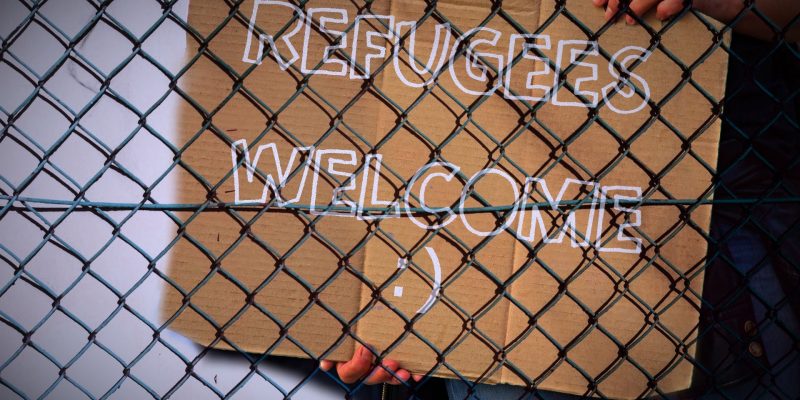1. 100,000 marched in the streets of Milan saying no to walls, yes to integration
On Saturday 20, in Milan, thousands of people took to the streets to say no to walls in the name of integration. An extraordinary show of solidarity towards immigrants and refugees – modelled after the one in Barcelona a few months ago – supported by a large network of organisations and civil society figurers, as well as the authorities of Milan. Read the article in Rai News and see the pictures from a beautiful day in Il Post.
2. The hosting centre in the hands of the Ndrangheta
Reporters and organisations had denounced it long ago (see for example Maria Cosentino’s report from 2015): the situation at the Hosting Centre for Asylum Seekers (CARA) of Isola Capo Rizzuto, Calabria – one of the largest in Europe – was extremely worrying, amid degradation, inhuman conditions and blatant criminal infiltrations. Eventually, the situation was also acknowledged by Catanzaro’s District Anti-Mafia Directorate, which conducted a massive raid against the Ndrangheta gang and its racket in the centre, bringing into custody 68 people accused of Mafia-type association and other crimes (including the local parson). Read the article in Rai News and watch the special for Agorà (for which the journalist Angela Caponnetto was chased and threatened).
3. NGOs, migrants, smugglers and investigations: everything you need to know
Over the last two months, NGOs rescuing migrants along the Central Mediterranean route have been accused of colluding with people smugglers and encouraging more boats to depart Libya by their mere presence. Angelo Romano, Claudia Torrisi and Andrea Zitelli have written a comprehensive report in Valigia Blu: everything from the myth of “taxi cabs for migrants” to the prosecutors’ dossiers, to how humanitarian missions at sea actually work (also read our own in-depth articles).
4. Libya, growing concerns over detention of asylum seekers
The disastrous humanitarian situation in Libya and inhuman treatment of asylum seekers in detention centres are hardly news. Yet another cry of alarm was raised by the UN High Commissioner for Refugees, Filippo Grandi, who said he was “shocked” by conditions at the facilities. Read the article in Deutsche Welle.
5. Turkey, a humanitarian disaster
Over a year from the signing of the EU-Turkey deal, millions of refugees are stranded in Erdogan’s country, barely surviving or reduced into slavery (children included). And Ankara’s regime does not want the world to know about it. Read Roberta Zunini’s report from Istanbul for L’Espresso.
6. Greece, a reception system on the verge of collapse
Asylum seekers in Greece risk losing vital assistance, following changes in the EU funding to humanitarian NGOs, which will be managed autonomously by the Greek government starting in late June. There are obvious risks of a “humanitarian gap”, and widespread fears of worsening conditions for the thousands of refugees stranded in the country. Read Robert Trafford’s article for the Independent.
7. Why Poland doesn’t want asylum seekers
Just like Hungary, Poland is no country for refugees. Despite pressures from the EU, the Polish government is refusing to abandon its hard stance and embrace policies of solidarity. All in the name of an ethnically homogeneous nation. Read Jan Cienski’s article in Politico.
8. Not only refugees: how the world forgot about internally displaced people
We cannot talk about refugees and ignore the plight of internally displaced people. In 2016 only, 31 million people were forced to leave their homes and move within the borders of their countries, but despite these numbers, the international community does not seem to give enough attention. Read Jeff Crisp’s op-ed for Chatham House and Rebecca Ratcliffe’s article for the Guardian.
9. The heart of Texas
There is a big heart beating at the centre of Trump’s America: this report from BuzzFeed tells how the City of Dallas became one of the most welcoming places for refugees and migrants.
10. Integration through technology: the NaTakallam formula
NaTakallam means, “Let’s speak” in Arabic. It is also the name of a start-up that turns refugees into Arabic teachers, thanks to an online platform that organises courses over Whatsapp and Skype – helping students of Arabic to speak the language and learn the culture, and even more importantly, providing refugees with an opportunity for employment and a precious source of income. Read the article in Vita and the story in Fast Company.
Translation by Francesco Graziosi.
Header photo: Pixia (CC BY 2.0).









